北师大版(2019)选择性必修 第二册Unit 5 Education Lesson 1 Enlightening a Mind 课件(共23张PPT)
文档属性
| 名称 | 北师大版(2019)选择性必修 第二册Unit 5 Education Lesson 1 Enlightening a Mind 课件(共23张PPT) |
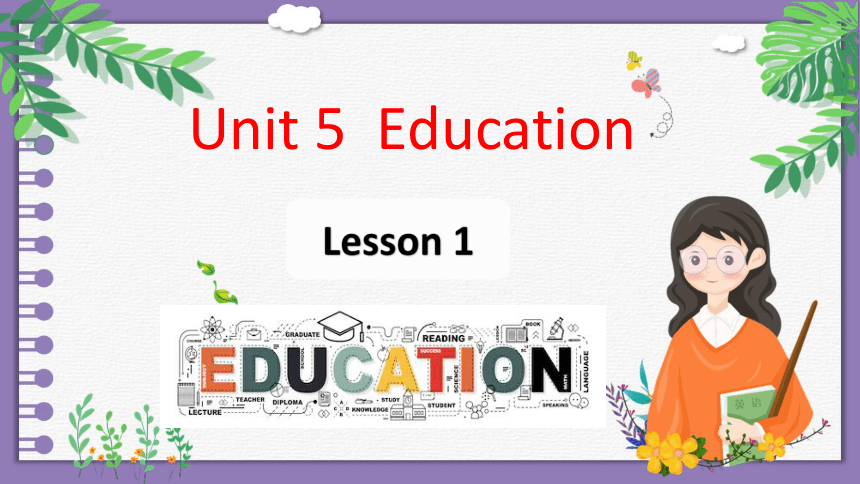
|
|
| 格式 | pptx | ||
| 文件大小 | 39.0MB | ||
| 资源类型 | 教案 | ||
| 版本资源 | 北师大版(2019) | ||
| 科目 | 英语 | ||
| 更新时间 | 2024-03-24 21:10:32 | ||
图片预览

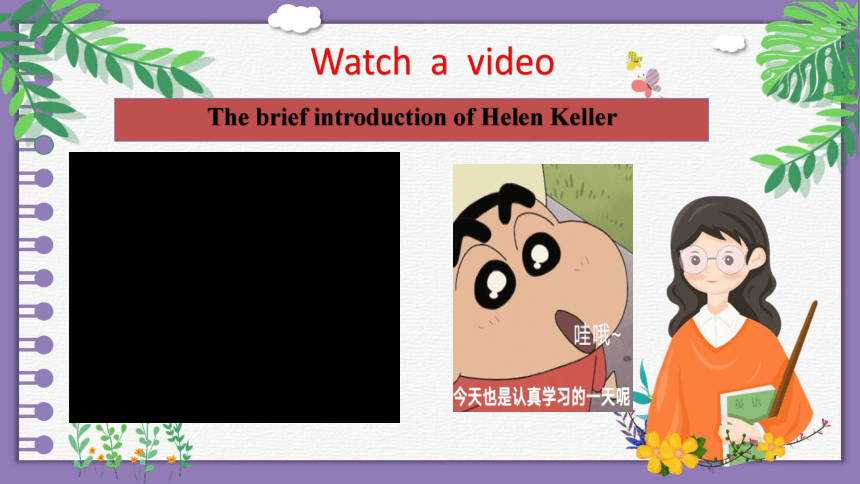
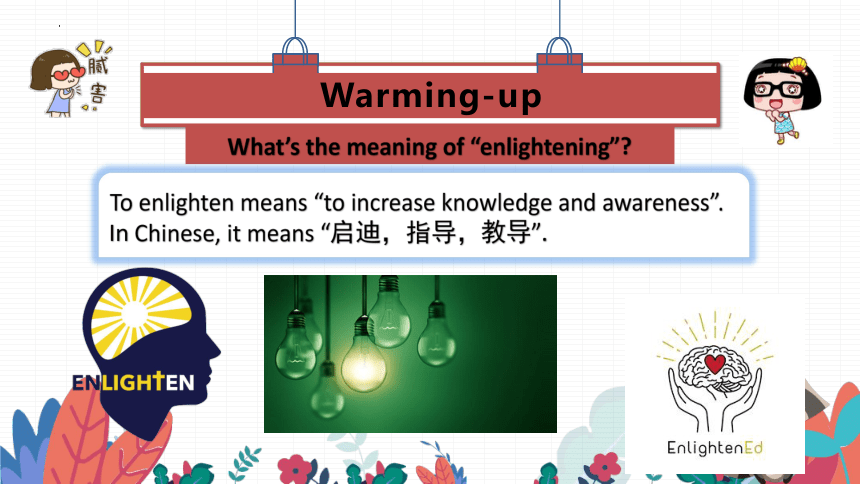
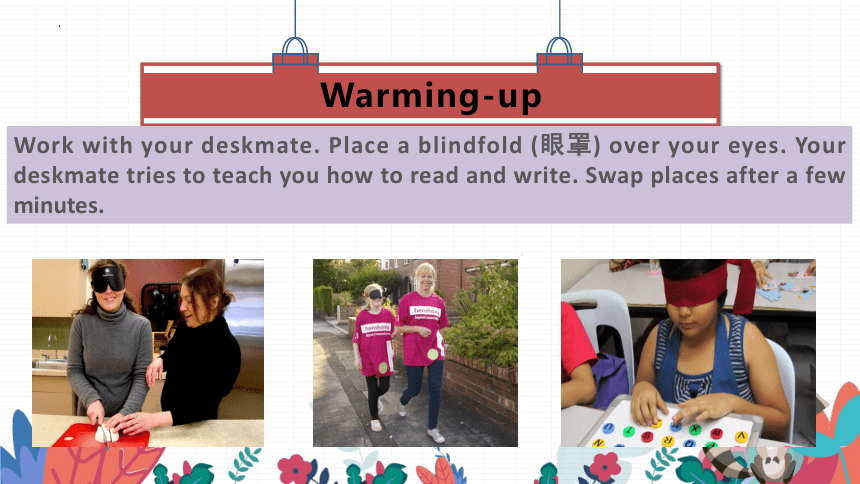
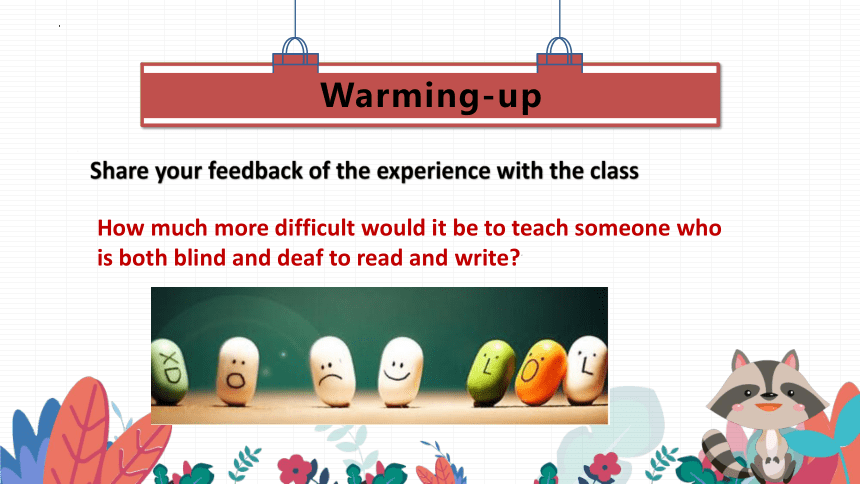
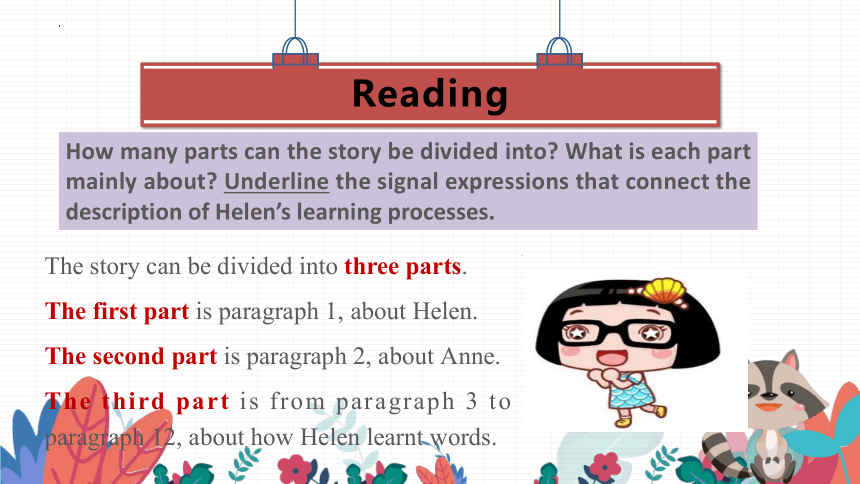
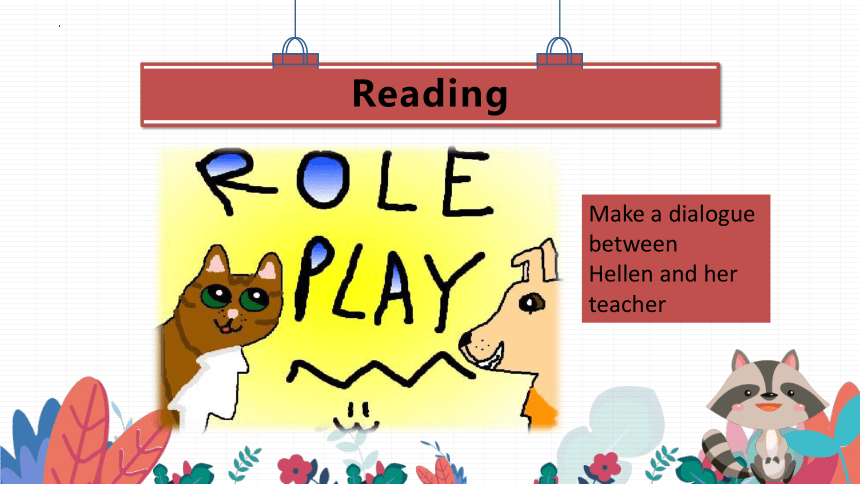
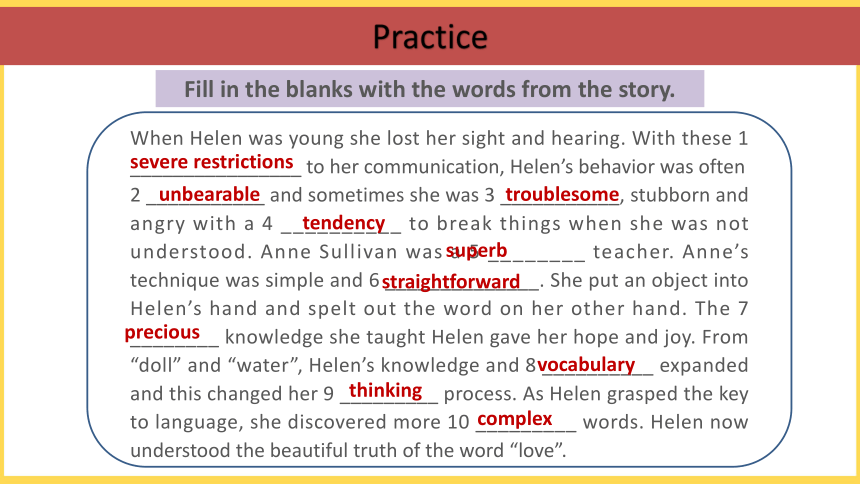
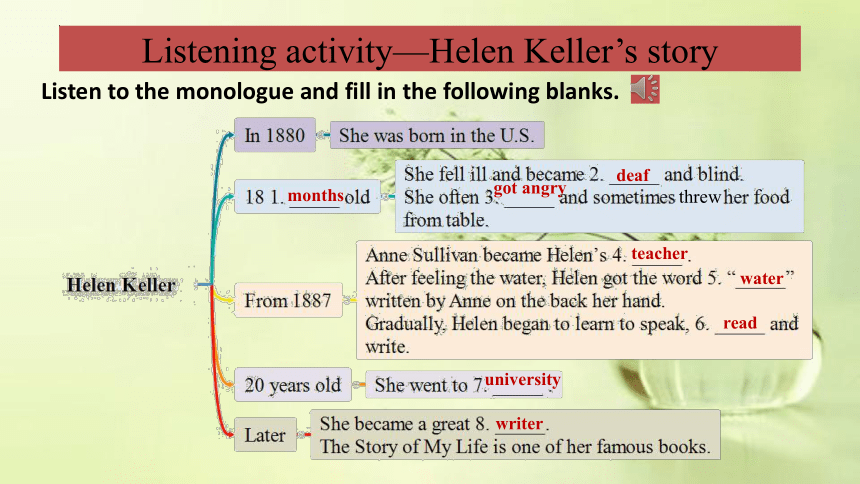
文档简介
(共23张PPT)
Unit 5 Education
Lesson 1
Watch a video
The brief introduction of Helen Keller
Warming-up
What’s the meaning of “enlightening”
To enlighten means “to increase knowledge and awareness”.
In Chinese, it means “启迪,指导,教导”.
Warming-up
Work with your deskmate. Place a blindfold (眼罩) over your eyes. Your deskmate tries to teach you how to read and write. Swap places after a few minutes.
Warming-up
Share your feedback of the experience with the class
How much more difficult would it be to teach someone who is both blind and deaf to read and write
How many parts can the story be divided into What is each part mainly about Underline the signal expressions that connect the description of Helen’s learning processes.
The story can be divided into three parts.
The first part is paragraph 1, about Helen.
The second part is paragraph 2, about Anne.
The third part is from paragraph 3 to paragraph 12, about how Helen learnt words.
Reading
Reading
Make a dialogue between
Hellen and her teacher
Fill in the blanks with the words from the story.
Practice
When Helen was young she lost her sight and hearing. With these 1 ________________ to her communication, Helen’s behavior was often 2 ___________ and sometimes she was 3 ___________, stubborn and angry with a 4 __________ to break things when she was not understood. Anne Sullivan was a 5 ________ teacher. Anne’s technique was simple and 6 ______________. She put an object into Helen’s hand and spelt out the word on her other hand. The 7 ________ knowledge she taught Helen gave her hope and joy. From “doll” and “water”, Helen’s knowledge and 8 __________ expanded and this changed her 9 _________ process. As Helen grasped the key to language, she discovered more 10 _________ words. Helen now understood the beautiful truth of the word “love”.
severe restrictions
unbearable
troublesome
tendency
superb
straightforward
precious
vocabulary
thinking
complex
Listening activity—Helen Keller’s story
Listen to the monologue and fill in the following blanks.
months
deaf
got angry
teacher
water
read
university
writer
threw
Listening activity—Helen Keller’s story
听力原文
Helen Keller was born in the U.S. in 1880. When she was 18 months old, she fell ill and became deaf and blind. Her parents loved her very much, but they did not know how to help her. She couldn’t see anything. She couldn’t hear anything. She couldn’t speak at all. Helen often got angry. Sometimes, she threw her food from the table. In 1887, her parents met a teacher, Anne Sullivan. Anne became Helen’s friend. She wanted to teach Helen words. But it was very hard. One day, Anne took Helen’s hand and let her feel the water. She wrote the word “water” on the back of Helen’s hand. And Helen got it. From that day on, Helen Keller began to study every day. She worked very hard. Helen learned many new words every day. She learned to speak, read and write. When she was 20 years old, she went to university. Later, she became a great writer. One of her famous books is The Story of My Life. Helen’s story gives everyone hope.
Text builder—Enlightening a mind
Introduction
The process of learning the four words and Helen’s feelings
Helen Keller:
She couldn’t __________________.
She was sometimes bad-tempered and had a tendency to ___________.
Anne Sullivan:
She was a teacher and had had eyesight problems early in life as well so she could ________________________.
speak, read or write
Enlightening a mind
relate to Helen’s difficulties
“doll”; “water”; “love”; “think”
break things
Text builder—Enlightening a mind
Introduction
The process of learning the four words and Helen’s feelings
Enlightening a mind
For the word “love”:
Anne let Helen _________ the doll, and then spelt the letter “D-O-L-L” on her hand.
Helen’s feelings:
She thought it was _______.
For the word “water”:
When water flowed over Helen’s hand, Anne spelt out “W-A-T-E-R” into Helen’s other hand.
Helen’s feelings:
She had ______________________.
She got the world of words opened up to her.
play with
a burst of understanding
a game
Text builder—Enlightening a mind
Introduction
The process of learning the four words and Helen’s feelings
Enlightening a mind
For the word “love”:
Helen could not understood it at first but later she knew that love could not __________ but be felt and without love we could not be happy.
Helen’s feelings:
She understood ______________________
_____.
For the word “think”:
When Helen was trying to solve a difficult problem, Anne ___________________ and wrote the word “think” on her hand.
Helen’s feelings:
She knew the meaning of the word _______.
be touched
touched her forehead
in a flash
the beautiful truth of the
word
Explain the following sentences and pay more attention to have/get something done.
Grammar—Have/Get Something Done
I fixed the washing machine.
I did it myself.
I had my washing machine fixed.
I asked someone to fix it for me.
We use the structure have/get sth done when we want to say that we ask someone else to do something for us.
用法
1. 表示“安排某人做某事,是某事被处理”。如:
Last year, we had the house rebuilt.
去年,我们的房子翻新过了。
(翻新房子不是我们自己,而是建筑工人。)
2. 表示“遭遇到某事”,通常是令人不愉快的事情。如:
She’s had her wallet taken.
她的钱包被偷了。
Grammar—Have/Get Something Done
3. 表示“处于某种状态”。这时候,也可以把have sth done中的done改为形容词或介词短语,做宾语补足语。如:
Brown has hardly any money saved for his old age.
布朗几乎没有为他的后半生存什么钱。
(布朗过着没有存款的生活。)
I had my eyes half-closed.
我半闭着眼睛。
(形容词half-closed作宾语补足语,意思相当于with my eyes half-closed。)
Grammar—Have/Get Something Done
时态变化
Grammar—Have/Get Something Done
tense have/get sth done
present simple I have/get my hair cut.
past simple I had/got my hair cut.
present continuous I’m having/getting my hair cut.
past continuous I was having/getting my hair cut.
present perfect I’ve had/got my hair cut.
past perfect I had had/got my hair cut.
simple future I will have/get my hair cut.
I’m going to have/get my hair cut.
1.你平时在哪里剪头发?
___________________________________________________________________
2.我们正在修车呢。
___________________________________________________________________
3.如果她够幸运的话,她的商业计划会被接纳。___________________________________________________________________
4.这药会让你很快恢复健康的。
___________________________________________________________________
Practice
Translate the following sentences with the structure of have/get something done.
Grammar—Have/Get Something Done
Where do you normally have your hair cut
We are having our car repaired.
If she’s lucky, she’ll have her business plan accepted.
The medicine will soon have you recovered.
Summarise the passage with what you have learnt in this lesson.
Assignment
Language points
【释义】
v. to be likely to do sth or to happen in a particular way because this is what often or usually happens
倾向于;趋向;伺侯;招待;注意
【例句】
Men tend to put on weight in middle age.
男人到了中年往往会发福。
Television companies tend to censor bad language in feature films.
电视公司往往会在审查故事片时删去其中的粗话。
【常用搭配】
[tend to/towards sth]
His views tend towards the extreme.
他的观点趋于偏激。
tend
/tend/
Language points
【释义】
adj. rare and worth a lot of money; valuable or important and not to be wasted 珍稀的;宝贵的
【例句】
The crown was set with precious jewels.
王冠上镶嵌着稀世珍宝。
You’re wasting my precious time!
你在浪费我的宝贵的时间!
【近义词】
valued adj. 重要的;宝贵的;贵重的
【词语辨析】precious, valuable
valuable 指有相当价值,可高价出售的,或有用、有益的东西。
precious 指因稀罕、不易得到而很值钱,或因本身的品质而具有极大的价值。
precious
/ pre s/
Language points
【释义】
v. to become greater in size, number or importance 扩大,增加,增强
【例句】
A child’s vocabulary expands through reading.
孩子的词汇量通过阅读得到扩大。
Our foreign trade has expanded during recent years.
近年来我们的对外贸易有所增加。
【同根词】
expansion n. 膨胀,扩张
expansive adj. 宽泛的,扩张的
【词语辨析】enlarge, increase, expand
这组词都有“增加,增大”的意思,其区别是:
enlarge 主要指面积或体积等的扩大。
increase 指数量、强度和大小等方面的扩大或增加。
expand 指范围、程度、体积和尺寸等方面的扩大或增加。
expand
/ k sp nd/
Thank You !
Unit 5 Education
Lesson 1
Watch a video
The brief introduction of Helen Keller
Warming-up
What’s the meaning of “enlightening”
To enlighten means “to increase knowledge and awareness”.
In Chinese, it means “启迪,指导,教导”.
Warming-up
Work with your deskmate. Place a blindfold (眼罩) over your eyes. Your deskmate tries to teach you how to read and write. Swap places after a few minutes.
Warming-up
Share your feedback of the experience with the class
How much more difficult would it be to teach someone who is both blind and deaf to read and write
How many parts can the story be divided into What is each part mainly about Underline the signal expressions that connect the description of Helen’s learning processes.
The story can be divided into three parts.
The first part is paragraph 1, about Helen.
The second part is paragraph 2, about Anne.
The third part is from paragraph 3 to paragraph 12, about how Helen learnt words.
Reading
Reading
Make a dialogue between
Hellen and her teacher
Fill in the blanks with the words from the story.
Practice
When Helen was young she lost her sight and hearing. With these 1 ________________ to her communication, Helen’s behavior was often 2 ___________ and sometimes she was 3 ___________, stubborn and angry with a 4 __________ to break things when she was not understood. Anne Sullivan was a 5 ________ teacher. Anne’s technique was simple and 6 ______________. She put an object into Helen’s hand and spelt out the word on her other hand. The 7 ________ knowledge she taught Helen gave her hope and joy. From “doll” and “water”, Helen’s knowledge and 8 __________ expanded and this changed her 9 _________ process. As Helen grasped the key to language, she discovered more 10 _________ words. Helen now understood the beautiful truth of the word “love”.
severe restrictions
unbearable
troublesome
tendency
superb
straightforward
precious
vocabulary
thinking
complex
Listening activity—Helen Keller’s story
Listen to the monologue and fill in the following blanks.
months
deaf
got angry
teacher
water
read
university
writer
threw
Listening activity—Helen Keller’s story
听力原文
Helen Keller was born in the U.S. in 1880. When she was 18 months old, she fell ill and became deaf and blind. Her parents loved her very much, but they did not know how to help her. She couldn’t see anything. She couldn’t hear anything. She couldn’t speak at all. Helen often got angry. Sometimes, she threw her food from the table. In 1887, her parents met a teacher, Anne Sullivan. Anne became Helen’s friend. She wanted to teach Helen words. But it was very hard. One day, Anne took Helen’s hand and let her feel the water. She wrote the word “water” on the back of Helen’s hand. And Helen got it. From that day on, Helen Keller began to study every day. She worked very hard. Helen learned many new words every day. She learned to speak, read and write. When she was 20 years old, she went to university. Later, she became a great writer. One of her famous books is The Story of My Life. Helen’s story gives everyone hope.
Text builder—Enlightening a mind
Introduction
The process of learning the four words and Helen’s feelings
Helen Keller:
She couldn’t __________________.
She was sometimes bad-tempered and had a tendency to ___________.
Anne Sullivan:
She was a teacher and had had eyesight problems early in life as well so she could ________________________.
speak, read or write
Enlightening a mind
relate to Helen’s difficulties
“doll”; “water”; “love”; “think”
break things
Text builder—Enlightening a mind
Introduction
The process of learning the four words and Helen’s feelings
Enlightening a mind
For the word “love”:
Anne let Helen _________ the doll, and then spelt the letter “D-O-L-L” on her hand.
Helen’s feelings:
She thought it was _______.
For the word “water”:
When water flowed over Helen’s hand, Anne spelt out “W-A-T-E-R” into Helen’s other hand.
Helen’s feelings:
She had ______________________.
She got the world of words opened up to her.
play with
a burst of understanding
a game
Text builder—Enlightening a mind
Introduction
The process of learning the four words and Helen’s feelings
Enlightening a mind
For the word “love”:
Helen could not understood it at first but later she knew that love could not __________ but be felt and without love we could not be happy.
Helen’s feelings:
She understood ______________________
_____.
For the word “think”:
When Helen was trying to solve a difficult problem, Anne ___________________ and wrote the word “think” on her hand.
Helen’s feelings:
She knew the meaning of the word _______.
be touched
touched her forehead
in a flash
the beautiful truth of the
word
Explain the following sentences and pay more attention to have/get something done.
Grammar—Have/Get Something Done
I fixed the washing machine.
I did it myself.
I had my washing machine fixed.
I asked someone to fix it for me.
We use the structure have/get sth done when we want to say that we ask someone else to do something for us.
用法
1. 表示“安排某人做某事,是某事被处理”。如:
Last year, we had the house rebuilt.
去年,我们的房子翻新过了。
(翻新房子不是我们自己,而是建筑工人。)
2. 表示“遭遇到某事”,通常是令人不愉快的事情。如:
She’s had her wallet taken.
她的钱包被偷了。
Grammar—Have/Get Something Done
3. 表示“处于某种状态”。这时候,也可以把have sth done中的done改为形容词或介词短语,做宾语补足语。如:
Brown has hardly any money saved for his old age.
布朗几乎没有为他的后半生存什么钱。
(布朗过着没有存款的生活。)
I had my eyes half-closed.
我半闭着眼睛。
(形容词half-closed作宾语补足语,意思相当于with my eyes half-closed。)
Grammar—Have/Get Something Done
时态变化
Grammar—Have/Get Something Done
tense have/get sth done
present simple I have/get my hair cut.
past simple I had/got my hair cut.
present continuous I’m having/getting my hair cut.
past continuous I was having/getting my hair cut.
present perfect I’ve had/got my hair cut.
past perfect I had had/got my hair cut.
simple future I will have/get my hair cut.
I’m going to have/get my hair cut.
1.你平时在哪里剪头发?
___________________________________________________________________
2.我们正在修车呢。
___________________________________________________________________
3.如果她够幸运的话,她的商业计划会被接纳。___________________________________________________________________
4.这药会让你很快恢复健康的。
___________________________________________________________________
Practice
Translate the following sentences with the structure of have/get something done.
Grammar—Have/Get Something Done
Where do you normally have your hair cut
We are having our car repaired.
If she’s lucky, she’ll have her business plan accepted.
The medicine will soon have you recovered.
Summarise the passage with what you have learnt in this lesson.
Assignment
Language points
【释义】
v. to be likely to do sth or to happen in a particular way because this is what often or usually happens
倾向于;趋向;伺侯;招待;注意
【例句】
Men tend to put on weight in middle age.
男人到了中年往往会发福。
Television companies tend to censor bad language in feature films.
电视公司往往会在审查故事片时删去其中的粗话。
【常用搭配】
[tend to/towards sth]
His views tend towards the extreme.
他的观点趋于偏激。
tend
/tend/
Language points
【释义】
adj. rare and worth a lot of money; valuable or important and not to be wasted 珍稀的;宝贵的
【例句】
The crown was set with precious jewels.
王冠上镶嵌着稀世珍宝。
You’re wasting my precious time!
你在浪费我的宝贵的时间!
【近义词】
valued adj. 重要的;宝贵的;贵重的
【词语辨析】precious, valuable
valuable 指有相当价值,可高价出售的,或有用、有益的东西。
precious 指因稀罕、不易得到而很值钱,或因本身的品质而具有极大的价值。
precious
/ pre s/
Language points
【释义】
v. to become greater in size, number or importance 扩大,增加,增强
【例句】
A child’s vocabulary expands through reading.
孩子的词汇量通过阅读得到扩大。
Our foreign trade has expanded during recent years.
近年来我们的对外贸易有所增加。
【同根词】
expansion n. 膨胀,扩张
expansive adj. 宽泛的,扩张的
【词语辨析】enlarge, increase, expand
这组词都有“增加,增大”的意思,其区别是:
enlarge 主要指面积或体积等的扩大。
increase 指数量、强度和大小等方面的扩大或增加。
expand 指范围、程度、体积和尺寸等方面的扩大或增加。
expand
/ k sp nd/
Thank You !
同课章节目录
- Unit 4 Humour
- Lesson 1 What’s So Funny?
- Lesson 2 Why Do We Need Humour?
- Lesson 3 My Favourite Comedian
- Unit 5 Education
- Lesson 1 Enlightening a Mind
- Lesson 2 The Objectives of Education
- Lesson 3 Understanding
- Unit 6 The Media
- Lesson 1 From Page to Screen
- Lesson 2 Questions about Media
- Lesson 3 The Advertising Game
